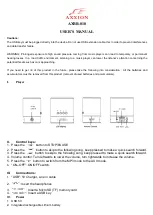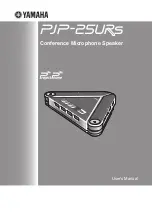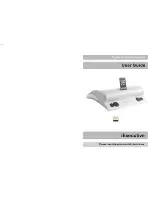
Maximum Input/Output Voltages
8
Chapter 1 - Safety
Maximum Input/Output Voltages
Receiver (Rear View)
Transmitter
1. Service Socket
Maximum voltage of ±12V.
2. Socket to Fetal Monitor
Maximum voltage of ±12V.
3. Power Input Socket
100-120V ~ or 220-240V ~
4. Event Marker/Service Socket
Maximum Voltage of +5V.
5. Toco Socket
Maximum Voltage of +5V.
6. Cardio Socket
Maximum Voltage of +5V.
Summary of Contents for 50 T Series
Page 6: ...vi Contents ...
Page 22: ...Application Overview 16 Chapter 2 Overview ...
Page 40: ...Solving Common Monitoring Problems 34 Chapter 4 Monitoring ...
Page 42: ...Solving Common Problems 36 Chapter 5 Fetal Movement Profile ...
Page 46: ...Setting Up the Marker 40 Chapter 6 Marking Events ...
Page 56: ...On a Wall 50 Chapter 8 Mounting the Receiver ...
Page 74: ...Declaration of Conformity 68 Chapter 11 Accessories and Technical Specifications ...















































